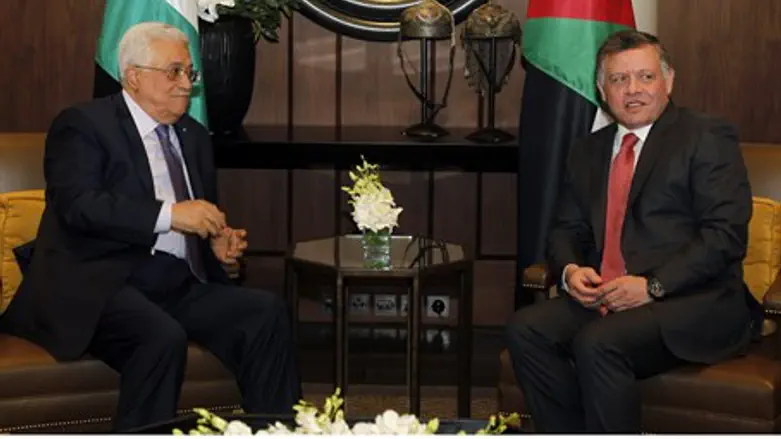
Jordan's tough stance towards Israel over Jerusalem's Temple Mount reflects a determination to preserve its custodianship of the flashpoint site as well as its own stability, analysts say.
By recalling its ambassador to Israel, the Hashemite kingdom sent a message that deploying police inside the mosque compound had "crossed a red line" and put their diplomatic ties in jeopardy.
In parallel, Jordan's King Abdullah II hosted a diplomatic push which brought together US Secretary of State John Kerry and Israeli Prime Minister Binyamin Netanyahu for talks in Amman on Thursday.
"Recalling the Jordanian ambassador and the diplomatic push sent a tough message to Israel that violating Al-Aqsa would endanger the peace treaty," Oraib Rantawi, head of Amman's Al-Quds Centre for Political Studies, told AFP.
Kerry would not have interrupted his busy schedule and flown to the region "unless Washington realized that ties were deteriorating between Jordan and Israel, and Israel and the Palestinians", he said.
The status of Jerusalem is one of the most contentious issues in the Israeli-Palestinian conflict, and the Temple Mount - Judaism's holiest site, which also houses the Al Aqsa mosque compound - is the scene of frequent confrontations between Islamist rioters and police.
Tensions soared to a new level earlier this month when Israeli police entered several meters inside the mosque to quell a particularly violent riot by Muslim extremists who had barricaded themselves inside and launched fireworks, rocks and firebombs at police.
"The violations at Al-Aqsa undermine the credibility and legitimacy of the Jordanian leadership and its ability to carry out its custodianship of the mosque," said Rantawi.
"It also an embarrassment towards its people, and this threatens the kingdom's stability and security," he added.
Jordan on the brink
Although no official census has been carried out, Jordan is believed to have a Palestinian Arab majority of anything between 60-75%.
Jordan occupied Judea, Samaria and eastern Jerusalem during the 1948 Arab-Israeli war, expelling the Jewish population and taking control of all holy sites. Israel liberated the area in the 1967 Six-Day War and later annexed Jerusalem - a move not recognized by most foreign powers. But even then, the Israeli government handed administrative control of the Mount back to the Jordanian-run Waqf, which since then has taken stringent measures to prevent Jews from worshipping at what is their holiest site - as well as undertaking a series of illegal digging operations which archaeologists describe as a blatant attempt to destroy ancient Jewish artifacts at the site.
In March 2013, Palestinian Authority leader Mahmoud Abbas signed a deal with King Abdullah, entrusting him with the defense of "Muslim holy sites" in Jerusalem. That deal included the Temple Mount, which both Abbas and Abdullah do not recognize as having any Jewish history.
The deal confirmed a verbal agreement dating back to 1924 that gave the kingdom's Hashemite leaders custodial rights over the Muslim holy sites.
"For Jordan, Al-Aqsa is an internal issue," said Mohammad Abu Rumman, researcher at the University of Jordan's Center for Strategic Studies, pointing to its custodianship and the Palestinian origins of many Jordanians.
Jordan is seen as a key player in Israeli-Palestinian peace talks, and King Abdullah has repeatedly called on Israel to end "its unilateral action and repeated attacks" against Jerusalem's holy sites.
Rantawi said this month's clashes at Al-Aqsa had "violated the historic Hashemite trusteeship, the peace treaty and the Palestinian-Jordan deal".
Hashemite legacy
The Hashemites claim direct descent from the founder of Israel Mohammed and were in the past also the custodians of Mecca and Medina - Islam's holiest sites in Saudi Arabia.
The history of the dynasty is intertwined with the Al-Aqsa mosque compound, where Sharif Hussein bin Ali al-Hashimi, who led the Great Arab Revolt of 1916 against Ottoman rule, is now buried.
His son, King Abdullah I, great-great-grandfather of the reigning monarch, established modern-day Jordan in 1921. He was assassinated in 1951 during Friday prayers at Al-Aqsa.
"Attacks on Al-Aqsa target the Jordanian leadership, its reputation and its relations with society," said Abu Rumman.
"They also go as far as raising questions - on the Jordanian street and the Arab street - over Jordan's legitimacy."
The unrest on the Temple Mount has infuriated Jordanians and sparked anti-Israeli demonstrations and calls for Amman to break its peace treaty with the Jewish state.
It also comes after Jordan joined US-led air strikes on the Islamic State jihadist group, which has seized large parts of Syria and Iraq, prompting fears of an Islamist backlash. Several pro-ISIS demonstrations have already been held in Jordan, though state-run media has been careful to downplay them or ignore them completely.
Abu Rumman said failure by Jordan to react to "violations" on the "Al Aqsa" would have fanned popular discontent and raised questions over its inaction.
He said the United States had understood what was at stake, and "pressure was put on Israel".
Following Thursday's talks, Jordanian Foreign Minister Nasser Judeh told reporters "firm commitments" were made to maintain the decades-old status quo that allows only Muslims to pray on the Temple Mount - despite a growing campaign by Jewish groups to push for equal prayer rights for Jews.
At the same time, on Friday Israel eased security restrictions and allowed Muslim men of all ages to pray at the Al Aqsa mosque for the first time in months.
AFP contributed to this report.